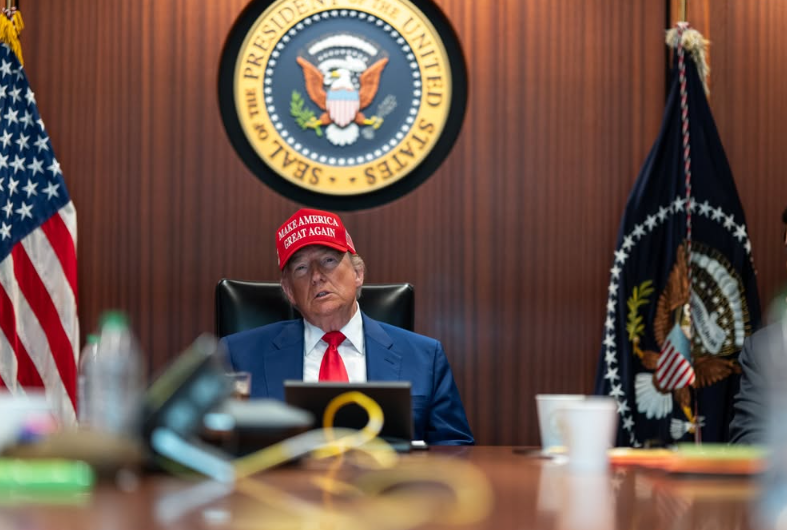Trump Considers Temporary Work Permits for Immigrant Labor in Key Industries
Input
Modified
“Reflecting industry demands amid labor shortages” From Crackdowns to U-Turns to Temporary Permits Shift in tone amid growing concerns over labor shortages in the field

President Donald Trump is reportedly moving forward with a “temporary work permit system” for immigrants employed in specific sectors. This policy shift appears to signal flexibility amid the administration’s otherwise hardline immigration stance, prompted by growing concerns over labor shortages in agriculture and the food service industry.
Temporary Permits for Agricultural Foreign Workers
According to NBC News on June 30 (local time), Trump stated in a Fox News interview, “We are working on issuing a type of temporary permit where immigrants pay taxes and farmers maintain some control.” He continued, “Currently, good people who have worked here for 15 or 20 years are being taken away from farms simply because they may have entered illegally. Farm labor is physically demanding and few others are willing to do it. Removing these workers risks bankrupting farmers.”
“We will do something for farmers and let them make the judgment themselves,” Trump emphasized. “Of course, we won’t be hiring murderers,” he added.
A Department of Homeland Security (DHS) spokesperson reaffirmed this position, following a reversal earlier this month in which the White House retracted a plan to ease immigration enforcement for certain industries. DHS reiterated that “there will be no safe harbor for industries shielding violent criminals or obstructing Immigration and Customs Enforcement (ICE).” The agency underscored that workplace enforcement remains “a key strategy for public safety, national security, and economic stability,” targeting illegal employment networks that “undermine American workers and destabilize the labor market.”
Whiplash in Immigration Policy
Trump’s latest remarks come in the wake of inconsistent enforcement measures—ICE briefly paused raids on farms, restaurants, and hotels last month, only to resume them shortly thereafter. On June 12, Trump wrote on his social media platform, Truth Social, that “the farm and hotel industries are suffering due to the risk of deportation for long-term skilled workers.” He added, “We must protect farmers. Change is coming.”
In fact, NBC News reported that the administration had temporarily halted enforcement actions in agricultural and hospitality sectors before swiftly reversing course.
Back in April, Trump also stated that he was reviewing ways for undocumented immigrants working on farms and in hotels to remain temporarily, then return legally. At the time, NBC cited administration sources suggesting that Trump was also interested in reforming the H-2A and H-2B visa programs.
This inconsistent approach seems driven by mounting complaints from American businesses employing immigrant labor. The restaurant industry, in particular, heavily depends on immigrant workers. According to the National Restaurant Association (NRA), one in five restaurant workers in the U.S. is a foreign national. While many possess legal work authorization, roughly one million undocumented immigrants are also employed in the sector.
Industry leaders argue that enforcement actions—such as canceling the legal status of thousands of immigrants—have worsened labor shortages. Both documented and undocumented workers are increasingly reluctant to participate in the labor market due to fear of arrest or deportation. “Some employees are too scared to even show up,” said Tony Foreman, who operates five restaurants in Maryland, in an interview with the Financial Times. “There isn’t a growing pool of people willing to do these jobs. It’s becoming harder to find qualified staff.”

Moral Sorting by the Government
The administration’s practice of categorizing immigrants into ‘good’ and ‘bad’ groups based on political convenience has drawn criticism. In an April interview with Fox News, Trump said his administration focuses on deporting “murderers,” while suggesting a “voluntary departure program” for others. “We’ll give them some money and a plane ticket,” he said, “and if they’re good people and we want them back, we’ll try to bring them back quickly.”
His comments reflect the administration’s recognition of America’s dependency on low-wage immigrant labor in agriculture and the service sector. The Associated Press described Trump’s remarks as a departure from his usual hardline stance that casts undocumented immigrants as criminals and promises mass deportations.
However, voluntary departure is a core tenet of Trump’s anti-immigration playbook. According to National Public Radio (NPR), the administration has heavily promoted large-scale deportations, stripped immigrants of temporary legal protections such as Social Security Numbers (SSNs), and emphasized a message of “leave voluntarily, or suffer the consequences.” This strategy aims to instill fear among immigrants that staying could lead to harsh treatment, while suggesting that leaving may allow for a legal return later—a claim many advocates view as manipulative.
The administration has also repurposed a Biden-era immigration app called CBP One—originally designed for pre-entry screening interviews—into “CBP Home,” a platform to facilitate voluntary departure. The advocacy group Immigrant Family Protection Alliance criticized this move, stating, “Immigrants are smart enough to see through the administration’s rhetoric. They won’t take promises of legal return at face value.”
The credibility of Trump’s approach is further undermined by recent actions. The administration insisted on labeling a legally documented Salvadoran immigrant—wrongfully deported due to an administrative error—as a “terrorist and MS-13 gang member,” despite a lack of evidence. Although the U.S. Supreme Court ruled on April 15 that the deported individual, Kilmar Abrego Garcia, had no criminal record and must be returned to the U.S., the Trump administration has ignored the ruling.





















